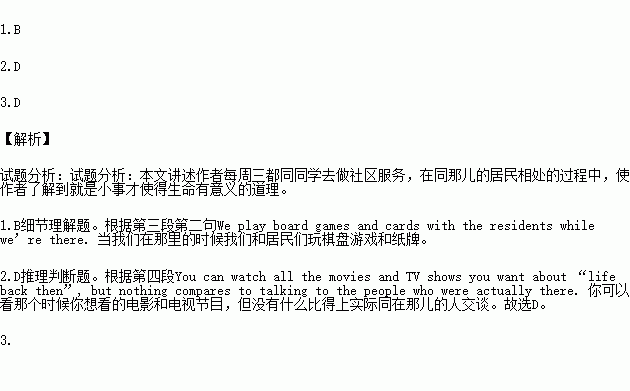题目内容
Every Wednesday, I go to Cantata Adult Life Services, a local retirement community in Brookfield, Illinois, US, with my classmates to do community service.
After my very first visit to Cantata, my life changed forever. That may sound a bit dramatic, but volunteering with the elderly has changed my views on life.
Our visits last about an hour, and we bring 25-30 students every time. We play board games and cards with the residents while we’re there.
You can watch all the movies and TV shows you want about “life back then”, but nothing compares to talking to the people who were actually there. Just hearing their stories has touched me in a way I never thought possible.
Whether it was talking to 98-year-old “Hurricane Hilda” about her glory days as a roller skater or chatting with Lou about the times she danced with a famous actor, I was completely attracted by every single memory the residents wanted to share with me.
Even the residents who don’t have amazing memories make the experience satisfying . I remember visiting Mrs Robinson. She couldn’t recall much about her past, but she told me she’d never forget how kind I wasjust to listen to her “rambling (漫谈)”. It made me realize that it’s the little things that make life worth living. That’s something I won’t forget anytime soon.
If there’s one thing I’ve realized in my three years of visiting Cantata, it’s that presence –just being there –means more than anything to many of the residents. And despite how busy our lives are, there’s always time to make someone’s day.
For me, it feels great to be a source of happiness, a smile on a bad day or a listening ear for old memories. And at the end of the day, that’s all that matters.It’s easy to feel like you don’t have anything in common with the elderly –especially when you’re a teenager. But that’s not true at all.
I hate to be overly clichéd (陈词滥调的) here, but age really is just a number. As young adults, it’s important for us to realize this sooner rather than later. We can learn a lot from the elderly, and they can often benefit from teenagers too.
1.What do the volunteers do according to the passage?
A. They share everything with the residents.
B. They play board games and cards with the residents.
C. They watch the residents play games.
D. They buy gifts for the residents.
2.According to the writer, what is the most important thing that volunteers can do for the elderly?
A. Playing with them. B. Benefiting from them.
C. Helping them. D. Being there with them.
3.What does the writer want to tell us by writing this passage ?
A. We don’t have anything in common with the elderly.
B. Age is just a number.
C. It is important to help the elderly.
D. Young adults and the elderly can benefit from each other.

